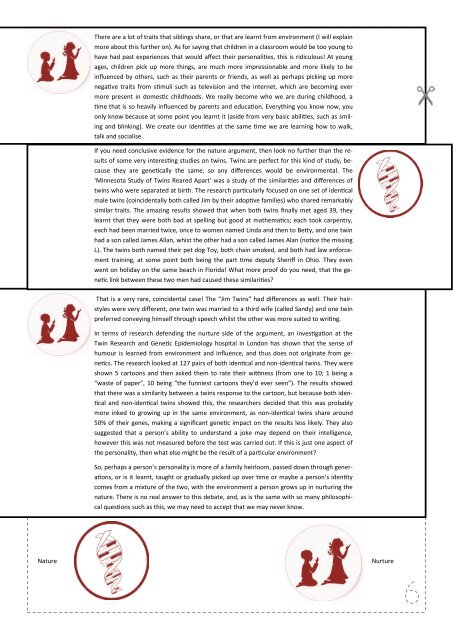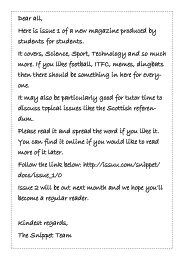Issue 2 Identity
Our second issue based around the theme of 'Identity'. The magazine is aimed at 11-15 year old students.
Our second issue based around the theme of 'Identity'. The magazine is aimed at 11-15 year old students.
You also want an ePaper? Increase the reach of your titles
YUMPU automatically turns print PDFs into web optimized ePapers that Google loves.
There are a lot of traits that siblings share, or that are learnt from environment (I will explain<br />
more about this further on). As for saying that children in a classroom would be too young to<br />
have had past experiences that would affect their personalities, this is ridiculous! At young<br />
ages, children pick up more things, are much more impressionable and more likely to be<br />
influenced by others, such as their parents or friends, as well as perhaps picking up more<br />
negative traits from stimuli such as television and the internet, which are becoming ever<br />
more present in domestic childhoods. We really become who we are during childhood, a<br />
time that is so heavily influenced by parents and education. Everything you know now, you<br />
only know because at some point you learnt it (aside from very basic abilities, such as smiling<br />
and blinking). We create our identities at the same time we are learning how to walk,<br />
talk and socialise.<br />
If you need conclusive evidence for the nature argument, then look no further than the results<br />
of some very interesting studies on twins. Twins are perfect for this kind of study, because<br />
they are genetically the same, so any differences would be environmental. The<br />
‘Minnesota Study of Twins Reared Apart’ was a study of the similarities and differences of<br />
twins who were separated at birth. The research particularly focused on one set of identical<br />
male twins (coincidentally both called Jim by their adoptive families) who shared remarkably<br />
similar traits. The amazing results showed that when both twins finally met aged 39, they<br />
learnt that they were both bad at spelling but good at mathematics; each took carpentry,<br />
each had been married twice, once to women named Linda and then to Betty, and one twin<br />
had a son called James Allan, whist the other had a son called James Alan (notice the missing<br />
L). The twins both named their pet dog Toy, both chain smoked, and both had law enforcement<br />
training, at some point both being the part time deputy Sheriff in Ohio. They even<br />
went on holiday on the same beach in Florida! What more proof do you need, that the genetic<br />
link between these two men had caused these similarities?<br />
That is a very rare, coincidental case! The “Jim Twins” had differences as well. Their hairstyles<br />
were very different, one twin was married to a third wife (called Sandy) and one twin<br />
preferred conveying himself through speech whilst the other was more suited to writing.<br />
In terms of research defending the nurture side of the argument, an investigation at the<br />
Twin Research and Genetic Epidemiology hospital in London has shown that the sense of<br />
humour is learned from environment and influence, and thus does not originate from genetics.<br />
The research looked at 127 pairs of both identical and non-identical twins. They were<br />
shown 5 cartoons and then asked them to rate their wittiness (from one to 10; 1 being a<br />
“waste of paper”, 10 being “the funniest cartoons they’d ever seen”). The results showed<br />
that there was a similarity between a twins response to the cartoon, but because both identical<br />
and non-identical twins showed this, the researchers decided that this was probably<br />
more inked to growing up in the same environment, as non-identical twins share around<br />
50% of their genes, making a significant genetic impact on the results less likely. They also<br />
suggested that a person’s ability to understand a joke may depend on their intelligence,<br />
however this was not measured before the test was carried out. If this is just one aspect of<br />
the personality, then what else might be the result of a particular environment?<br />
So, perhaps a person’s personality is more of a family heirloom, passed down through generations,<br />
or is it learnt, taught or gradually picked up over time or maybe a person’s identity<br />
comes from a mixture of the two, with the environment a person grows up in nurturing the<br />
nature. There is no real answer to this debate, and, as is the same with so many philosophical<br />
questions such as this, we may need to accept that we may never know.<br />
Nature<br />
Nurture






